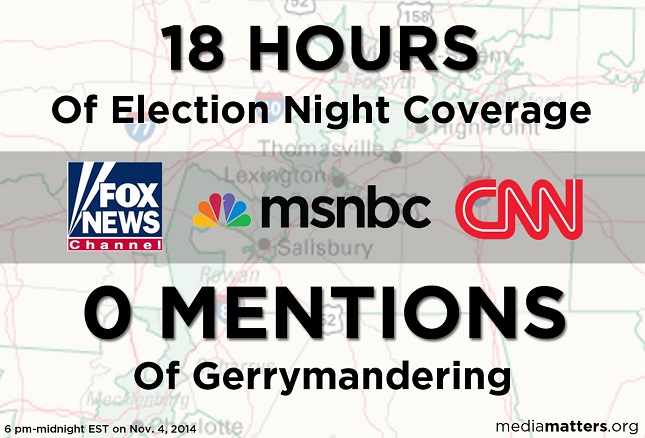Election experts have observed that a heavy dose of congressional redistricting after the 2010 elections has polarized the nation and given Republicans an advantage in elections for years to come, but the practice's impact on election outcomes was all but ignored during the major cable news outlets' 2014 election night broadcasts.
Cable News' Election Night Coverage Ignored Impact Of Redistricting On Outcomes
Written by Brian Powell
Published
2010 GOP Victories Led To Redistricting In The Party's Favor
Brennan Center for Justice: Gerrymandered Districts Put GOP “In Position To Maintain Long-Term Control Of About 11 More Seats.” A 2012 report by New York University's Brennan Center for Justice explained that states redrew Congressional districts across the country following the 2010 Census. The report noted that redistricting can determine future election outcomes because “both parties use redistricting to tilt the electoral terrain to achieve specific political objectives” and found that, “Republicans were the clear winners of the 2010 redistricting cycle” (emphasis original):
Republicans were the clear winners of the 2010 redistricting cycle. [added emphasis] Compared to the current partisan makeup of Congress, the net effect of redistricting was roughly a “wash.” However, before redistricting, Republicans were not in position to maintain long-term control of several seats they won in the 2010 election. During redistricting, Republican-controlled legislatures shored up many of their recent gains: The GOP may now be in position to maintain long-term control of about 11 more seats than they would have under the pre-redistricting district lines. As a result, Democrats will find it harder to gain the 25 seats needed to take control of the House in 2012. [Brennan Center for Justice, 10/25/12]
Vox: Post-2010 Gerrymanders “Disproportionately Benefited Republicans.” Vox noted that political scientists agree that since the 2010 Census, there have been “some egregious partisan gerrymanders” that disproportionately benefited the GOP:
Political scientists disagree about the degree to which gerrymandering is responsible for Republicans' House majority. But there's general agreement, as Vox's Andrew Prokop put it, that there have been “some egregious partisan gerrymanders” since the 2010 Census. Because Republicans controlled more state governments than Democrats did post-2010, those gerrymanders disproportionately benefited Republicans, but Democratic states got in on the action too. [Vox, 11/5/14]
Washington Post: "Gerrymandering Is At Least Partly To Blame For The Lopsided Republican Representation In The House." According to Christopher Ingraham at The Washington Post's Wonkblog, going into the 2014 midterm elections, Democrats were “under-represented by about 18 seats in the House, relative to their vote share in the 2012 election” and "[t]he way Republicans pulled that off was to draw some really, really funky-looking Congressional districts." [The Washington Post, 5/15/14]
Analysis Showed Republican Redistricting Created Imbalance In 2012 House Results. In a February 2013 New York Times op-ed, Princeton University data scientist Sam Wang noted that "[p]oliticians, especially Republicans facing demographic and ideological changes in the electorate, use redistricting to cling to power." His analysis found 10 states in which the vote totals did not reflect the House seats, seven of which were states redistricted by Republicans:
In the seven states where Republicans redrew the districts, 16.7 million votes were cast for Republicans and 16.4 million votes were cast for Democrats. This elected 73 Republicans and 34 Democrats. Given the average percentage of the vote it takes to elect representatives elsewhere in the country, that combination would normally require only 14.7 million Democratic votes. Or put another way, 1.7 million votes (16.4 minus 14.7) were effectively packed into Democratic districts and wasted. [The New York Times, 2/2/13]
Cable News Ignored The Impact Of Gerrymandering On Election Night
Cable News' Election Night Programming Entirely Ignored Impact Of Gerrymandering. Pundits, analysts, and correspondents on CNN, Fox News, and MSNBC all ignored the impact of redistricting during election night coverage from 6 pm-Midnight EST on November 4, 2014:
 [Media Matters, 11/6/14]
[Media Matters, 11/6/14]
Methodology: Media Matters performed a LexisNexis transcript search for “gerrymand! or redistrict!” for November 4, 2014. Data represents results from 6 pm-Midnight EST on Fox News, MSNBC, and CNN.
Graphic by Leanne Naramore